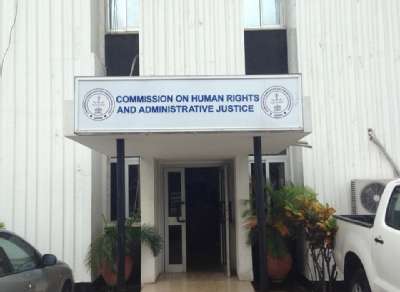The Commission on Human Rights and Administrative Justice (CHRAJ) has issued a measured endorsement of the recent actions taken by the Ghana Immigration Service (GIS) regarding the detention of undocumented migrants.
This response follows a widely publicized operation on May 16, 2025, that targeted foreign nationals without legal residency in Accra and other major urban centers across Ghana.
CHRAJ acknowledged that the presence of undocumented migrants in public spaces presents significant challenges to public safety and order.
In a statement, the Commission expressed appreciation for GIS’s efforts to address the issue, citing both the reputational impact on the country and the precarious conditions under which these migrants often live.
“The Commission commends the efforts by GIS to address the disturbing situation, which on one hand, creates an unfavorable image for the country while on the other hand, puts these migrants in an extremely vulnerable and dehumanizing conditions.”
Commission on Human Rights and Administrative Justice (CHRAJ)
This dual concern—national dignity and human vulnerability—formed the crux of CHRAJ’s commentary on the government’s recent operation.

In its formal communication, CHRAJ reiterated that Ghana, like all sovereign nations, has the authority to regulate its borders and determine who may reside within its jurisdiction.
This position, the Commission noted, is consistent with both Ghanaian law and international legal instruments such as the Global Compact for Safe, Orderly and Regular Migration (GCM).
Ghana, as a recognized champion of the GCM, is expected to lead in shaping and implementing responsible migration policies.
Calls For Humane Deportation Measures
However, CHRAJ was quick to balance its support for enforcement actions with a firm reminder of Ghana’s human rights obligations under both the 1992 Constitution and international treaties.
The Commission cited multiple frameworks, including the International Convention on the Protection of the Rights of All Migrant Workers and Members of Their Families, as well as the ECOWAS Free Movement Protocol, which outline protections owed to migrants, regardless of their documentation status.
The Commission emphasized that while public health, order, and safety remain paramount concerns, any decision to repatriate undocumented migrants must be carried out with humanity and respect for personal dignity.

CHRAJ stressed that such deportation decisions should be made on a case-by-case basis, to ensure compliance with the principle of non-refoulement—a doctrine of international law that prohibits returning individuals to countries where they may face harm or persecution.
“This, in the considered view of the Commission, would avoid situations whereby migrants are sent back to the countries of origin where they may apprehend persecution or harm.”
Commission on Human Rights and Administrative Justice (CHRAJ)
The Commission also drew attention to the demographic makeup of those affected by the GIS operation.
It highlighted that a significant number of the undocumented migrants detained are women and children, a reality that adds further urgency to ensuring gender-responsive and child-sensitive procedures during enforcement exercises.
“The Commission wishes to remind GIS and relevant stakeholders that, given the significant proportion of undocumented migrants who are women and children, such operations should be gender responsive and prioritise the best interests of the child.”
Commission on Human Rights and Administrative Justice (CHRAJ)
Gov’t Urged to Rethink Immigration Strategy
Looking beyond the immediate challenges, CHRAJ urged the government to adopt more sustainable and forward-looking strategies to address the root causes of irregular migration.
The Commission emphasized the importance of long-term policy planning and regional collaboration to effectively manage migration in a way that balances national security with human rights obligations.

“The Commission proposes a more sustainable intervention through interstate cooperation between Ghana and relevant States be strengthened to effectively address any migration-related issues going forward.”
Commission on Human Rights and Administrative Justice (CHRAJ)
Such regional dialogue, it suggested, could help mitigate the root causes of migration, strengthen border controls, and foster mutual understanding of migration dynamics across West Africa.
As public discourse continues to swirl around the government’s handling of undocumented migrants, CHRAJ’s position may offer a middle ground between strict immigration control and humanitarian responsibility.
While endorsing the need for law enforcement, the Commission’s nuanced stance underscores the importance of maintaining Ghana’s longstanding commitment to human rights.
With growing concerns over national security and social order, CHRAJ’s recommendations may influence both policy and public perception as Ghana navigates the complexities of migration management.
READ ALSO: Ghana’s Electricity Demand to Rise in 2025 Amidst Increasing Fuel Costs




















